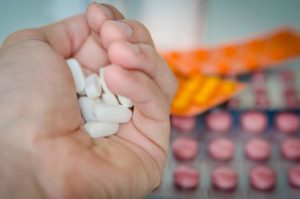Don’t Use a Kitchen Spoon to Measure Medications

When it comes to the medicines we take, it’s so important to take the correct dose. Too much and we might experience an overdose and dangerous side effects. Too little, and the drug might not work as intended.
With pills and capsules, it’s mainly a matter of remembering to take the right number every day and at the right time. But with liquid and powder medicines, things are a bit more complicated. We have to measure the correct amount of these medicines—and experts say many of us are getting the wrong dose because we’re using a regular kitchen spoon rather than a measuring spoon!
Need convincing? Next time you’re in a department store, check out the flatware display—you’ll see quite a difference in spoon size among silverware patterns. And take a look at the teaspoons and tablespoons in your own silverware drawer. Pour a teaspoon or tablespoon of water from a measuring spoon into your silverware spoon. It can be a real eye opener! Some teaspoons are actually closer to a tablespoon in size. Others are rather dainty—just right for stirring tea, but small enough that they would only hold a fraction of the recommended dose.
In a 2010 study from Cornell University, published in the Annals of Internal Medicine, study participants were asked to measure liquid medication with a kitchen spoon. According to the study, the participants “underdosed by more than 8 percent when using medium-size spoons, and overdosed by an average of almost 12 percent—up to 20 percent—when using larger spoons. Yet, participants were confident that they had poured correct doses in all the test cases.”
Study author Dr. Brian Wansink, who is head of the Cornell University Food & Brand Lab, said that over the course of time, this error in dosing can really add up. He said, “It can lead to overdosing, or also to underdosing, potentially to beneath the point of effectiveness.”
Wansink and co-author Koert van Ittersum of Georgia Tech recommend using a dosing spoon or syringe, or perhaps the measuring cap that comes with some liquid or powder medicines. In 2016, they also urged the U.S. Food and Drug Administration to mandate that the pharmaceutical industry switch from teaspoons to milliliters in dosage instructions.
As evidence that this is a good idea, they conducted a new study in which they observed participants who were asked to measure liquid medications. When the dosage direction was given in teaspoons, participants were much more likely to just reach for a kitchen spoon, rather than using a more accurate measuring device. Said van Ittersum, “While we feel that we can estimate teaspoon doses, milliliters are much harder to estimate visually, therefore people are more likely to use accurate measuring spoons or cups when given dosage information in milliliters.”
So if you or a senior loved one take liquid medicines, put away the kitchen spoon and be sure to use a designated medicine spoon, dosing cup, syringe or dropper instead. If your loved one has low vision, get a spoon with large print numbers and gradation marks. And if you’re in a pinch and those aren’t available, use actual measuring spoons—not the spoon you’d use to eat your soup or stir your coffee.
Source: IlluminAge AgeWise reporting on research from the Cornell University Food & Brand Lab.

